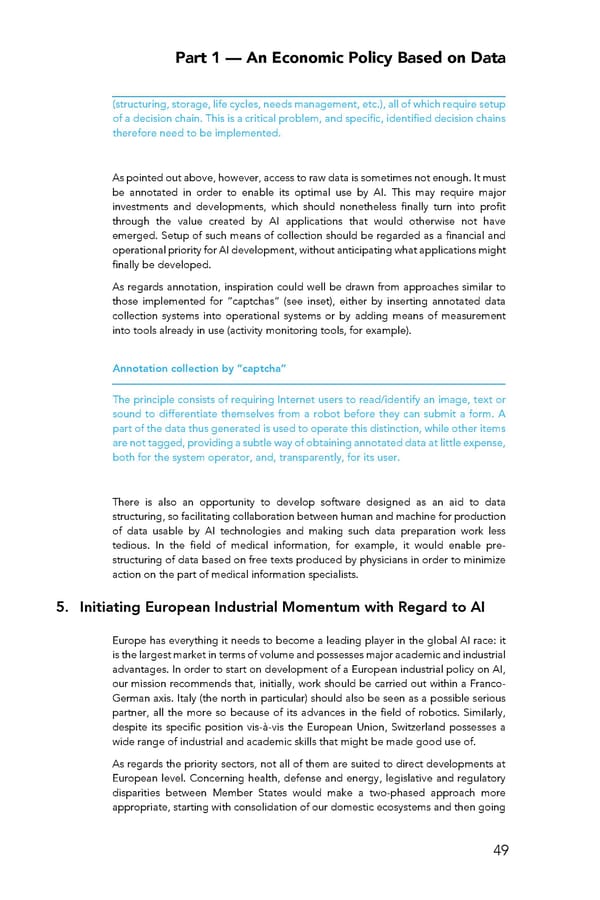Part 1 — An Economic Policy Based on Data (structuring, storage, life cycles, needs management, etc.), all of which require setup of a decision chain. This is a critical problem, and specific, identified decision chains therefore need to be implemented. As pointed out above, however, access to raw data is sometimes not enough. It must be annotated in order to enable its optimal use by AI. This may require major investments and developments, which should nonetheless finally turn into profit through the value created by AI applications that would otherwise not have emerged. Setup of such means of collection should be regarded as a financial and operational priority for AI development, without anticipating what applications might finally be developed. As regards annotation, inspiration could well be drawn from approaches similar to those implemented for “captchas” (see inset), either by inserting annotated data collection systems into operational systems or by adding means of measurement into tools already in use (activity monitoring tools, for example). Annotation collection by “captcha” The principle consists of requiring Internet users to read/identify an image, text or sound to differentiate themselves from a robot before they can submit a form. A part of the data thus generated is used to operate this distinction, while other items are not tagged, providing a subtle way of obtaining annotated data at little expense, both for the system operator, and, transparently, for its user. There is also an opportunity to develop software designed as an aid to data structuring, so facilitating collaboration between human and machine for production of data usable by AI technologies and making such data preparation work less tedious. In the field of medical information, for example, it would enable pre- structuring of data based on free texts produced by physicians in order to minimize action on the part of medical information specialists. 5. Initiating European Industrial Momentum with Regard to AI Europe has everything it needs to become a leading player in the global AI race: it is the largest market in terms of volume and possesses major academic and industrial advantages. In order to start on development of a European industrial policy on AI, our mission recommends that, initially, work should be carried out within a Franco- German axis. Italy (the north in particular) should also be seen as a possible serious partner, all the more so because of its advances in the field of robotics. Similarly, despite its specific position vis-à-vis the European Union, Switzerland possesses a wide range of industrial and academic skills that might be made good use of. As regards the priority sectors, not all of them are suited to direct developments at European level. Concerning health, defense and energy, legislative and regulatory disparities between Member States would make a two-phased approach more appropriate, starting with consolidation of our domestic ecosystems and then going 49
 For a Meaningful AI - Report Page 49 Page 51
For a Meaningful AI - Report Page 49 Page 51